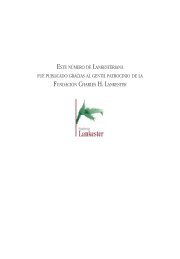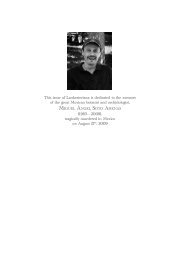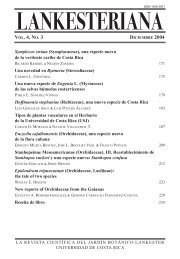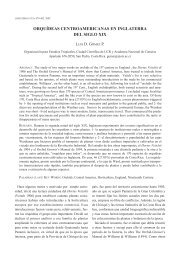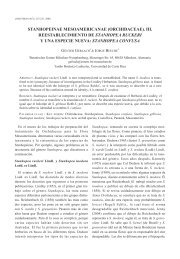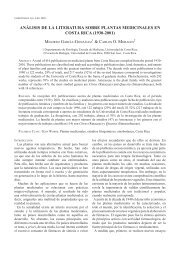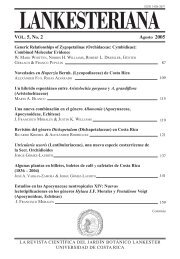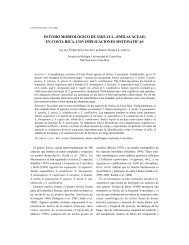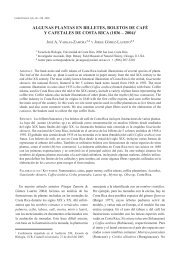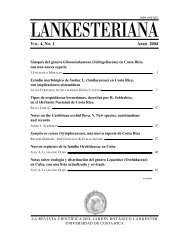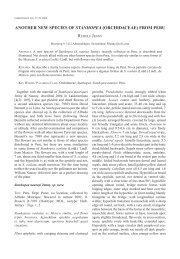orchids and orchidology in central america. 500 ... - lankesteriana.org
orchids and orchidology in central america. 500 ... - lankesteriana.org
orchids and orchidology in central america. 500 ... - lankesteriana.org
You also want an ePaper? Increase the reach of your titles
YUMPU automatically turns print PDFs into web optimized ePapers that Google loves.
98<br />
<strong>in</strong>terfere” (Boyle, 1983: 71-72). And similar words<br />
from Williams: “...the plants are heedlessly torn from<br />
their natural habitats, which are sometimes ruthlessly<br />
cleared of the beautiful flowers that cannot be replaced<br />
<strong>in</strong> the locality. We are sorry to hear of some of our<br />
collectors hav<strong>in</strong>g so little respect for these treasures<br />
of nature’s production that they gather all they can,<br />
hav<strong>in</strong>g no regard for the future, <strong>and</strong> not even leav<strong>in</strong>g<br />
a few plants <strong>in</strong> the locality to <strong>in</strong>crease <strong>and</strong> multiply<br />
by shedd<strong>in</strong>g their seed to germ<strong>in</strong>ate naturally over<br />
the mounta<strong>in</strong>s, rocks, <strong>and</strong> trees” (Williams, 1885:<br />
13). “[...] Very few of our present day collectors<br />
have reta<strong>in</strong>ed that enthusiasm which allowed their<br />
predecessors to bear all hardships with joy, all their<br />
disappo<strong>in</strong>tments with serenity. Roezl was one of the<br />
last representatives of those glorious few who, <strong>in</strong> all<br />
respects, were characteristic of his time” (Anonymous,<br />
1885: 222).<br />
In 1853, one year before Roezl traveled the first<br />
time to America, James Veitch acquired the Chelsea<br />
nurseries from Messrs. Knight <strong>and</strong> Perry. Veitch’s<br />
second son, Harry James Veitch (1840-1924) made<br />
an apprenticeship at the famous French nursery firm,<br />
Vilmor<strong>in</strong>-Andrieux & Co., <strong>in</strong> Paris, <strong>and</strong> returned <strong>in</strong><br />
1858 to help his father. “His <strong>in</strong>dustry <strong>and</strong> bus<strong>in</strong>ess<br />
sense rapidly became apparent, <strong>and</strong> the firm of Messrs.<br />
James Veitch & Sons soon enjoyed the reputation<br />
of be<strong>in</strong>g the foremost nursery bus<strong>in</strong>ess <strong>in</strong> the world.<br />
Harry’s <strong>in</strong>fluence <strong>in</strong> the bus<strong>in</strong>ess extended over almost<br />
the whole of his long <strong>and</strong> useful life. “The Veitches<br />
sent numerous plant collectors to the various parts of<br />
the world <strong>and</strong> rendered a great service to botany <strong>and</strong><br />
horticulture by their <strong>in</strong>troduction of new species <strong>and</strong><br />
hybrids” (Re<strong>in</strong>ikka, 1995: 247). Among the Veitch’s<br />
collectors who visited our region we f<strong>in</strong>d Gustav<br />
Wallis, A. R. Endrés, Gottlieb Zahn, Ge<strong>org</strong>e Downton,<br />
Carl Kramer <strong>and</strong> Richard Pearce. A detailed account<br />
of Veitch’s most important publication, the Hortus<br />
Veitchii, published <strong>in</strong> London <strong>in</strong> 1906, is given <strong>in</strong> the<br />
follow<strong>in</strong>g chapter.<br />
John Dom<strong>in</strong>y (1816-1892), the nurseries’ chief<br />
hybridizer, is credited with rais<strong>in</strong>g (1854) <strong>and</strong> flower<strong>in</strong>g<br />
(1856) the world’s first orchid hybrid (Calanthe ×<br />
Dom<strong>in</strong>ii), which lead to the breed<strong>in</strong>g of hundreds<br />
of new <strong>orchids</strong> as well as the establishment of a new<br />
branch of horticulture. This was a highly controversial<br />
achievement <strong>in</strong> Victorian Brita<strong>in</strong> as it was regarded as<br />
LANKESTERIANA<br />
LANKESTERIANA 9(1—2), August 2009. © Universidad de Costa Rica, 2009.<br />
tamper<strong>in</strong>g with nature. “Sir Harry Veitch retired from<br />
bus<strong>in</strong>ess <strong>in</strong> 1914. With his brothers John <strong>and</strong> Arthur<br />
both deceased, there was no successor <strong>in</strong> the family,<br />
<strong>and</strong> rather than los<strong>in</strong>g the recognized reputation which<br />
the firm had acquired, he disposed of the nursery <strong>and</strong><br />
sold the l<strong>and</strong> for redevelopment” (Re<strong>in</strong>ikka, 1995: 249).<br />
Many new orchid species <strong>and</strong> hybrids were dedicated<br />
to the Veitches, among them: Cypripedium veitchianum<br />
C. Lem., Dendrobium veitchianum L<strong>in</strong>dl., Macodes<br />
veitchii Boxall, Masdevallia veitchiana Rchb.f., <strong>and</strong><br />
Phalaenopsis veitchiana Rchb.f.<br />
A word must be said at this po<strong>in</strong>t about Karl<br />
Eduard Ortgies (1829-1916). He was born <strong>in</strong> Bremen,<br />
Germany, <strong>and</strong> chose the career of a gardener. For<br />
many years, he worked <strong>in</strong> Engl<strong>and</strong> <strong>in</strong> the gardens<br />
of Chatsworth, Syonhouse <strong>and</strong> Regents Park, <strong>and</strong><br />
<strong>in</strong> Belgium, at the Van Houtte establishment. In the<br />
summer of 1855 he was called to become Chief<br />
Gardener at the Botanic Garden <strong>in</strong> Zurich, a call he<br />
obeyed, although he hated to leave the Establissement<br />
<strong>and</strong> the Van Houtte family that had become dear to<br />
him. The Zurich Botanic Garden, weakly donated,<br />
was supposed to raise the necessary funds by sell<strong>in</strong>g<br />
plants <strong>and</strong> seed, without neglect<strong>in</strong>g its scientific duties,<br />
s<strong>in</strong>ce it had to provide the University of the canton<br />
<strong>and</strong> the Zurich Polytechnikum (only recently founded<br />
at that time) with the necessary plants for lectures.<br />
Ortgies was not only able to achieve the necessary<br />
funds by trade, he also made remarkable profits<br />
that he was able to use for the renovation of the old<br />
conservatories, the build<strong>in</strong>g of new conservatories,<br />
water supply, a rock garden for Alp<strong>in</strong>es, <strong>and</strong> so on.<br />
Consider<strong>in</strong>g his efforts, he received from the High<br />
Government on his 20 year jubilee the title of an<br />
Inspector <strong>and</strong> a considerable raise of his salary. He<br />
was especially <strong>in</strong>terested <strong>in</strong> <strong>in</strong>troduc<strong>in</strong>g new or rare<br />
plants, <strong>and</strong> knew to use his contacts to overseas<br />
countries. All the many deliveries by Roezl arrived<br />
at the market by <strong>in</strong>tercession of Ortgies. From Zurich<br />
he ran a huge import nursery, held many auctions <strong>in</strong><br />
London <strong>and</strong> had bus<strong>in</strong>ess contacts with the lead<strong>in</strong>g<br />
market gardens of Engl<strong>and</strong>, Belgium <strong>and</strong> Germany.<br />
If Roezl was able to f<strong>in</strong>ish his life as a f<strong>in</strong>ancially<br />
comfortable owner of a house <strong>in</strong> tranquility - a fate<br />
that unfortunately only very few plant hunters have -<br />
he owes it all to his diligent <strong>and</strong> true friend Ortgies.<br />
After Roezl, the deserv<strong>in</strong>g traveler Wallis applied for



